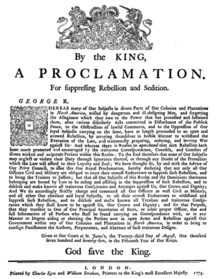Proclamation of Rebellion
With the Proclamation of Rebellion , German declaration of the rebellion of 23 August 1775, the British King George III reacted . officially on the Battle of Bunker Hill on June 17, 1775, one of the battles of the American Revolutionary War, which cost the British .
In a letter to Lord Sandwich dated July 1, 1775, the king described his attitude towards the colonies:
" I am of the opinion that when once these rebels have felt a smart blow, they will submit; and no situation can ever change my fixed resolution, either to bring the colonies to due obedience to the legislature of the mother country or to cast them off! "
“I believe these rebels will surrender if they have just been hit hard; no political situation could ever change my firm stance, either to bring the colonies back into obedience to the laws of the motherland or to give them up! "
Under the official title, A Proclamation for Suppressing Rebellion and Sedition , the British government proclaimed an "open insurrection" in the Thirteen Colonies . British officials were urged "to go to extremes to resist and suppress such a rebellion". The proclamation also called on subjects throughout the British Empire, including those in the United Kingdom itself, to report for punishment anyone who "trafficked" with the rebels.
The proclamation was written before the Colonial Office, under the direction of Colonial Secretary Lord Dartmouth, became aware of the Olive Branch petition of the Continental Congress . After the King refused to take the petition, the Proclamation of Rebellion is Britain's official response to the Congress petition.
On October 27, 1775, the British cabinet under Prime Minister Lord North became clearer. In a speech from the throne in front of parliament, George III. from that the rebellion was fueled by a "hopeless conspiracy" by the Crown against disloyal leaders. In truth, the rebels wanted to create an "independent empire". The speech made it clear that the government intended to end the crisis by force of arms. To this end, she even wanted to consider “friendly offers of help from abroad” in order to suppress the rebellion without the British having to fight against the British. A pro-American minority in parliament warned the government against forcing the colonists to become independent - many colonists' leaders had made it clear that this was not their intention.
On December 6th, the Continental Congress passed an answer to the proclamation. While the delegates affirmed their loyalty to the Crown, they also stressed that the British Parliament could not exercise political authority over the colonies, as they were not democratically represented. It is the duty of Congress to resist the "intolerable laws" that violate the British Constitution. Should supporters in the UK be punished for “promoting, supporting or advancing the cause of American freedom” this would be rewarded. The congress stated that one still hopes to be able to avert the "calamities of a civil war".
Both the proclamation and the speech from the throne weakened the position of balanced delegates in the Continental Congress. John Dickinson took the view that the problem lay with the British Parliament and that an appeal to the King would clarify the situation. He had revised Thomas Jefferson's first draft of the Olive Branch Petition and defused the text. When it became clear that the king would not intervene, this strengthened the position of the patriots, independence-minded delegates like John Adams . Thomas Paine's work Common Sense , published January 10, 1776, stated that no solution to the conflict could be expected from the king. On July 4, 1776, the Continental Congress passed the United States' Declaration of Independence .
Individual evidence
- ↑ a b King George III's Address to Parliament, October 27, 1775. Retrieved April 14, 2018 .
- ^ Pauline Maier: American Scripture: Making the Declaration of Independence . Knopf, New York 1997, ISBN 978-0-679-77908-7 , pp. 24-25, 249-50 .
- ↑ Maier, American Scripture , p. 25.
Web links
- Text of the proclamation in the Library of Congress , accessed April 14, 2018.
- Answer of the Continental Congress to the Proclamation of Rebellion of December 6, 1775 , accessed April 14, 2018.
